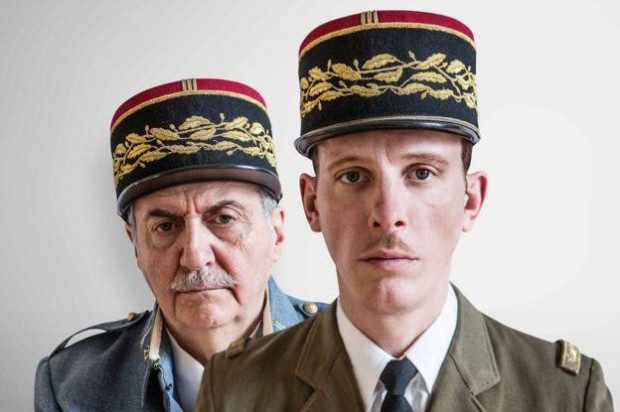Laurence Fox has this week joined an increasing band of actors hitting back at misbehaving audience members who seem to forget that they are in public rather than their own living room. He ramped up the drama by launching a foul-mouthed attack on a heckler before storming offstage during a live performance at a London theatre.
During the play, The Patriotic Traitor at the Park Theatre, he was heard to say: ‘I won’t bother telling you the story because this cunt in the front row has ruined it for everybody.’ The audience member had been muttering and heckling during the play and apparently became so loud that, for Fox, it was impossible to deal with.
Now, alongside the usual perils of corpsing and terrible reviews, live performers are increasingly having to deal with rowdy and badly behaved punters. In the old days, performances of Hamlet by the likes of Gielgud and Irving, were imprinted upon people’s minds for the right reasons: gripping performances within stupendous productions. Benedict Cumberbatch’s Hamlet last year, however, will most likely be remembered for him pleading fans not to disrupt performances by filming them.
Audience disruption has mushroomed. Kevin Spacey at the Old Vic remained in character to tell a punter whose mobile was ringing: ‘If you don’t answer that, I will.’ On Broadway last July Patti LuPone broke character during the play Shows For Days and grabbed the mobile of a woman who’d been texting the whole time. Also last summer a punter jumped onstage at Broadway’s Hand to God, attempting to plug his phone into a charger.
‘I was in a play at the Orange Tree in Richmond, when an old gent fell asleep in the front row,’ says Ed Stoppard. ‘Owing to the intimate size of the theatre and the blocking of the scene, I could have nudged him awake without even fully extending my arm, which maybe I should have done as the audience were far more engrossed by him than by me.’
Kaspar Holten, director of opera at the Royal Opera House, has noticed that booing has worsened at the opera too, and last June said, after a production of William Tell received an extraordinarily riotous reception: ‘We’ve had booing before, but to have it during the music and to that extent is new to me.’
James Haddrell, artistic and executive director of the Greenwich Theatre, says: ‘Audience etiquette is changing. Increasingly people talk, vocally react to what’s happening on stage, come in and out of the theatre to visit the bar… And it’s much more common for people to want to film.’
It used to be that the scrunching of a couple of sweet wrappers or slurp of a Kia-Ora (for those too young, a popular 1970s fruit drink allegedly tasting of orange) was the height of the distress both audience and performers alike had to endure. However today, it can at times almost seem like anything goes.
In 2013 James McAvoy shouted at a man filming him in Macbeth. When Martin Freeman appeared in Richard III at the Trafagar Studios a year ago, there were similarly problems, with Hobbit fans clapping and cheering. The pressure to cast younger actors famous from TV and film may be partly to blame for undisciplined audiences. ‘If people aren’t engaged then let’s incentivise them to leave rather than let them pass the time in a disruptive way,’ says Haddrell. ‘Venues should offer refunds for anyone leaving a show before the end of the first half – in a restaurant you’d send your meal back to the kitchen if it wasn’t cooked properly, so why not in the theatre?’Malcolm Sinclair, president of actors’ union, Equity, isn’t convinced audience disruption is getting worse: ‘It depends on your perspective. Compared to the 18th and 19th centuries, we are still a model of decorum.’
Actors have been known to blame themselves if an audience is badly behaved: John Gielgud reckoned that if he caught audience members talking or jittery, he considered it was his fault, that he had failed to keep their attention. Mark Dolan isn’t buying that, in comedy performances, anyway. ‘Even Jerry Seinfeld, at the height of his fame, complained during a gig “how big do I have to be for you guys to shut the fuck up?” He still couldn’t get people to be quiet.’ Helen Lederer was once interrupted on stage by Michael Fagan, who stalked the Queen, at the King’s Head Theatre in Islington. ‘He just wanted a chat. I had a chat, in character, and he went away.’ ‘If someone could come up with a device that put all phones in the vicinity on ‘silent’, that would be good,’ says Stoppard. ‘And free toffees, unwrapped, at the box office. But then I’ve heard an audience member call out to the actors on stage to “speak up, please”, not without justification, so we’re not blameless ourselves.’ More audience mayhem: A Los Angeles production of Cat on a Hot Tin Roof was cancelled in 2014 when an actor attacked a drunk heckler. In 2015 Keira Knightley filed a harassment complaint in New York after a man shouted “We’re going to be in heaven together” during a Broadway performance of Thérèse Raquin. In 2009 Ian Hart ran from the stage of London’s Duke of York’s Theatre to lunge at a member of the audience during the performance of Speaking in Tongues after he’d stood up to applaud and talked during the performance. Richard Griffiths at the Wyndham’s told an audience member whose phone was ringing that ‘the 750 people here would be fully justified in suing you for ruining their afternoon.’ Ben West is a freelance writer





Comments